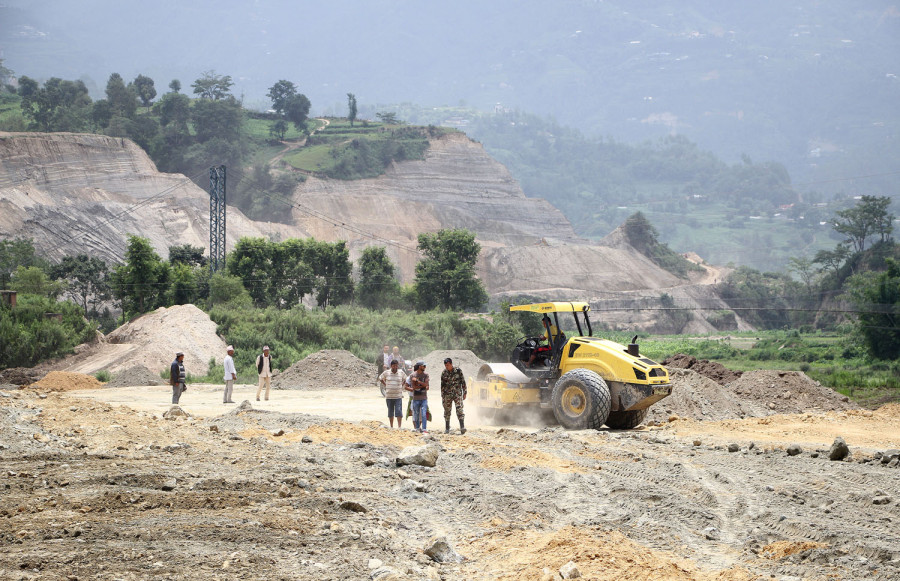Editorial
Efficiency eludes the army
Delays to the Kathmandu-Tarai expressway will further put forth compounded challenges.
Reports that the Nepal Army has failed to spend around half of the annual budget allocated for the Kathmandu-Tarai expressway project, that too for the second year running, are worrying. The development in its current iteration, earmarked as a national pride project, was planned to be completed by 2021. It now has a completion date for sometime in 2024. If the army has been unable to utilise the allocated resources for two whole fiscal years, it points towards a further extension of the deadline. The incompetence is staggering. Now that the army has taken over the responsibility for this project, it must complete all necessary tasks in a timely fashion. Otherwise, it will show the country’s state agency for national security is not above the bungling incompetence of the private sector players that it has wholeheartedly agreed to compete with.
Against all common sense, the KP Oli government in 2016 had decided to hand over the reins of the expressway project to the Nepal Army. This move was unusual because, traditionally, the role of an army is to ensure national security—especially in a defensive modality against external state actors. Therefore, the army’s willingness to handle such a project, essentially making it a commercial contractor, was deemed controversial.
Back then, the Oli administration had cited the escalating costs attached to the estimate provided by the Indian consortium of Infrastructure Leasing and Financial Services Transportation Networks, IL&FS Engineering and Construction, and Suryavir Infrastructure Construction in 2015 as being the reason for handing the project over to the army. The government purchased a separate detailed project report concerning the expressway from South Korean firm Soosung Engineering and Consulting. Ironically, the report quoted a price tag of Rs213 billion—a whopping Rs80 million higher than the Indian consortium’s calculations. Nonetheless, the then Sher Bahadur Deuba administration in 2017 decided to go along with the Oli cabinet’s decision and hand over the project to the army—along with accepting the now higher costs.
Nepal has for years suffered at the hands of private construction contractors. In December 2019, it was found that more than 1,800 contracts related to seven ministries, worth a cumulative Rs118 billion, were sick. The problems have not been limited to local firms. International contractors, such as the Spanish company related to the Tribhuvan International Airport Modernisation Project, have also contributed to the slowdown in development. It was perhaps due to this fact that the government decided to endorse an army-led build, even though the Nepal Army lacked the expertise and scope.
But the Nepal Army has now shown its failings. It had no problems clearing up 27,000 trees to create a route for the expressway, popularly called the Kathmandu-Tarai fast track. However, when it came to implementing the complex engineering challenges associated with parts of the expressway, it realised the need for international consultants and specialised contractors. It is the hiring process for these international partners that has stymied the sustained and timely development of the expressway.
However, any delays to the project will further put forth compounded challenges in the future. Any delays in the procurement of equipment and raw materials now will only make the costs rise in the future. The lack of necessary consultants will further delay construction, making the project miss completion deadlines. Moreover, the lack of timely capital expenditure and further delays on this important expressway—which is supposed to cut travel time by more than half—will intensify the loss of potential economic growth and aggregate demand. The army must step up its game and find the needed experts in haste. The government on its part needs to hold the army to the exact standards the people expect all contractors to be held—the concerned must be punished accordingly for failing to adhere to the schedule.
***
What do you think?
Dear reader, we’d like to hear from you. We regularly publish letters to the editor on contemporary issues or direct responses to something the Post has recently published. Please send your letters to [email protected] with "Letter to the Editor" in the subject line. Please include your name, location, and a contact address so one of our editors can reach out to you.




 20.12°C Kathmandu
20.12°C Kathmandu













